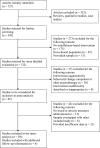The effect of mindfulness-based therapy on anxiety and depression: A meta-analytic review
- PMID: 20350028
- PMCID: PMC2848393
- DOI: 10.1037/a0018555
The effect of mindfulness-based therapy on anxiety and depression: A meta-analytic review
Abstract
Objective: Although mindfulness-based therapy has become a popular treatment, little is known about its efficacy. Therefore, our objective was to conduct an effect size analysis of this popular intervention for anxiety and mood symptoms in clinical samples.
Method: We conducted a literature search using PubMed, PsycINFO, the Cochrane Library, and manual searches. Our meta-analysis was based on 39 studies totaling 1,140 participants receiving mindfulness-based therapy for a range of conditions, including cancer, generalized anxiety disorder, depression, and other psychiatric or medical conditions.
Results: Effect size estimates suggest that mindfulness-based therapy was moderately effective for improving anxiety (Hedges's g = 0.63) and mood symptoms (Hedges's g = 0.59) from pre- to posttreatment in the overall sample. In patients with anxiety and mood disorders, this intervention was associated with effect sizes (Hedges's g) of 0.97 and 0.95 for improving anxiety and mood symptoms, respectively. These effect sizes were robust, were unrelated to publication year or number of treatment sessions, and were maintained over follow-up.
Conclusions: These results suggest that mindfulness-based therapy is a promising intervention for treating anxiety and mood problems in clinical populations.
(c) 2010 APA, all rights reserved
Figures



Comment in
-
Review: mindfulness-based therapies effective for anxiety and depression.Evid Based Ment Health. 2010 Nov;13(4):116. doi: 10.1136/ebmh.13.4.116. Evid Based Ment Health. 2010. PMID: 21036978 No abstract available.
-
Two recently published meta-analyses on the effectiveness of mindfulness-based interventions: what should the reader make of it?J Psychosom Res. 2010 Dec;69(6):613-4; author reply 614-5. doi: 10.1016/j.jpsychores.2010.09.004. J Psychosom Res. 2010. PMID: 21109050 No abstract available.
References
-
- Baer R. Mindfulness training as a clinical intervention: A conceptual and empirical review. Clinical Psychology: Science and Practice. 2003;10:125–143.
-
- Beck AT, Beck RW. Screening depressed patients in family practice: A rapid technique. Postgraduate Medicine. 1972;52:81–85. - PubMed
-
- Beck AT, Steer RA. Beck Anxiety Inventory Manual. The Psychological Corporation; San Antonio, TX: 1990.
-
- Beck AT, Steer RA. Beck Scale for Suicidal Ideation. The Psychological Corporation; San Antonio, TX: 1991.
Publication types
MeSH terms
Grants and funding
LinkOut - more resources
Full Text Sources
Other Literature Sources
Medical

